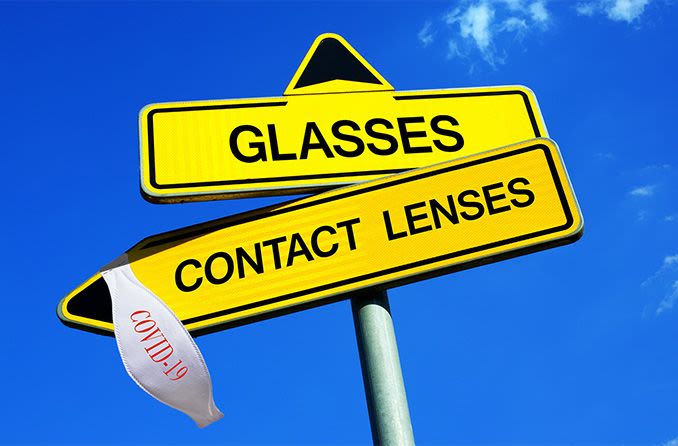Glasses or contact lenses? Which keeps your eyes safer from coronavirus infection?

In the beginning of the coronavirus pandemic, researchers suggested that contact lenses may make people more susceptible to contracting the disease. They also recommended switching your contact lenses for glasses, as they offer more protection from infectious respiratory droplets.
While some studies show wearing glasses, goggles or other protective eyewear could reduce the risk of COVID-19 infection, it doesn’t mean continuing to wear contact lenses is unsafe or puts you at a higher risk of being infected.
Does wearing glasses protect against coronavirus infection?
A report published by JAMA Ophthalmology in September 2020 studied the link between wearing glasses and susceptibility to COVID-19. The study used 276 patients who had been hospitalised with COVID-19 and gathered information on their eyewear habits, including whether the patient wore eyeglasses and for how long they wore glasses each day.
Only 16 of the 276 patients (approximately 5.8%) wore glasses for eight hours per day. Researchers compared this to the percentage of people in the local population who wore glasses for eight hours per day (31.5%).
Because of this comparison, they concluded that wearing glasses for eight hours per day will lower your susceptibility to COVID-19. While the numbers may reflect a lower percentage of glasses wearers in the sample group, there are a few arguments against the claim.
First, it’s well known that coronavirus spreads through infected respiratory droplets that are breathed in through the nose and mouth. However, the infection rate through the eyes is still unknown.
While touching the eyes with contaminated hands or other objects can lead to infection, frequent hand washing — especially before touching your eyes, nose and mouth — can combat the spread of germs.
Next, many hospitals have mandated eye protection, such as face shields and goggles for their employees. The World Health Organization explains that this type of personal protective equipment (PPE) is more appropriate for healthcare workers since they frequently work closely with infected people. However, for non-healthcare workers, it’s uncertain whether eye goggles or face shields are beneficial.
Finally, it’s important to note that eyeglasses do not offer the same protection as a face shield or goggles. The gap between the lenses of glasses and the eyes makes it possible for infectious droplets to reach the eyes.
In the JAMA study mentioned earlier, people who wore glasses all day were still infected with COVID-19. So, while it’s plausible that eyeglasses may offer a small amount of protection, they make no significant difference in one’s susceptibility to coronavirus.
SEE RELATED: Eye protection and airborne transmission in COVID times
COVID-19 and contact lenses: How to wear them safely
The Centers for Disease Control and Prevention (CDC) reports that there is no evidence to suggest contact lens wearers are at a higher risk for getting COVID-19 than eyeglass wearers.
With this in mind, there are steps you can take to keep yourself safe while continuing to wear contact lenses during the pandemic.
Thoroughly wash your hands with soap and water and dry hands with a clean, lint-free towel before touching your eyes or handling contact lenses. This should happen every time before you insert or remove your contacts. If soap and water are not readily available, use hand sanitiser with at least 60% alcohol content.
Disinfect contact lenses using an eye doctor-recommended lens disinfectant if you have extended-wear contacts. Also, find out from your eye doctor how often you should clean your contacts and follow the recommended schedule. If you wear daily disposable contacts, throw them away each evening and avoid wearing them longer than instructed.
Stop wearing contacts if you are sick, even if the illness is not related to coronavirus. Wearing contact lenses while fighting off cold or flu-like symptoms can cause symptoms to spread to the eyes. At the onset of symptoms, it’s recommended to change your contact lenses for eyeglasses until symptoms are no longer present.
Keeping your eyes healthy during COVID-19
Based on the information available, people can safely wear eyeglasses or contact lenses during the pandemic without putting their eyes at risk, as long as they keep their hands and eyewear clean. Whichever form of vision correction you choose, it’s important to take care of your eyes, whether or not a pandemic is occurring.
If you wear glasses, wash your lenses and frames regularly with dish soap and water. Not only will this keep your glasses looking shiny and new, but it will prevent germs from spreading to your eyes. It may also help prevent your glasses from fogging up while wearing a face mask.
For those who wear contact lenses, clean your contacts as directed by your eye doctor, and don’t wear the lenses longer than recommended. It’s also important to never sleep in your contacts unless approved by your eye doctor.
Whether you choose to wear glasses or contacts, keeping your hands and fingers clean is essential. Avoid touching your face without first washing your hands, especially if you’re touching surfaces shared by multiple people.
Washing your hands, wearing a mask and remaining socially distant from others is the best way to keep your eyes and body healthy during COVID-19.
READ NEXT: The COVID-19 vaccine: Will it affect your vision?
Association of daily wear of eyeglasses with susceptibility to coronavirus disease 2019 infection. JAMA Ophthalmology. September 2020.
Coronavirus disease (COVID-19): How is it transmitted? World Health Organization. April 2021.
Rational use of personal protective equipment for coronavirus disease 2019 (COVID-19). World Health Organization. February 2020.
Frequently asked questions: Should contact lens wearers take special precautions to prevent COVID-19? Centers for Disease Control and Prevention. May 2021.
Top contact lens experts dispel misinformation regarding coronavirus. Eyewire News. March 2020.
Page published on Friday, 21 May, 2021





